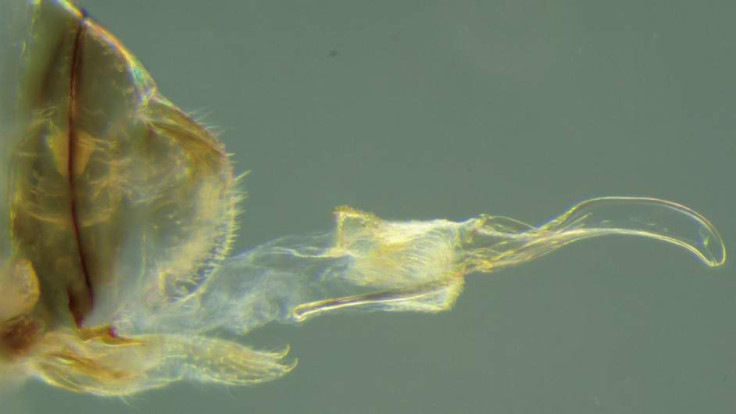Female Insects with Penis-like Sex Organs Discovered in Brazil
The end of the female's penis fits into the male's genitalia, allowing her to collect a sperm capsule over the course of their 40 to 70 hours of copulation

Researchers have discovered one of the first sex reversals in nature, with little-known cave insects in Brazil.
During copulation, which lasts between 40 to 70 hours, female insects insert an elaborate, penis-like organ into males' vagina-like opening. The researchers believe that the insects' sex organs and sex-role reversal may have been driven over evolutionary time by hunger, as there are few food sources in the cave environment where the bugs live. The males provide females with nutritious seminal gifts in addition to sperm, making it advantageous for females to mate at a higher rate.
At first, Rodrigo Ferreira from the Federal University of Lavras in Brazil was focused on a description of species in the cave environment where Neotrogla lives. He sent specimens off to insect specialist Charles Lienhard in Geneva, who recognised them as a new genus. Lienhard also discovered the females' penis-like organs.
To learn more, the researchers observed the mating behavior of all four species to find that the penis-like structure, called the gynosome, is inserted into males and used to receive generous capsules of nourishment and sperm. Once inside a male, the membranous part of the female gynosome inflates and numerous spines internally anchor the two insects together.
In one gruesome experiment, the researchers attempted to pull a male and female apart. The male's abdomen was ripped from the thorax without breaking the genital coupling, demonstrating how tightly the females hold on to the males.
The findings were reported in the Cell Press journal Current Biology and lead the way for interesting studies into what makes these insects so special. Neotrogla offers new opportunities to test ideas about sexual selection, conflict between the sexes, and the evolution of novelty, the researchers say.
"It will be important to unveil why, among many sex-role-reversed animals, only Neotrogla evolved the elaborated female penis," says Yoshitaka Kamimura from Keio University in Japan. For that, the researchers will look into studies of behavior, physiology, and more. The next stage of the research is to establish a healthy population of the insects in the lab.
The insects feed on bat droppings and possess what researchers have called an "evolutionary novelty." Kazunori Yoshizawa, who led researchers from Japan's Hokkaido University, told Sky News that the females controlled the entire mating process.
"Because the female anchoring force is very strong, a male's strong resistance may cause damage to his genitalia.
"Therefore, it is very likely that entire mating processes are controlled actively by females, whereas males are rather passive."
He added: "Females of Neotrogla likely represent the most macho females among animals discovered to date."
© Copyright IBTimes 2025. All rights reserved.






















